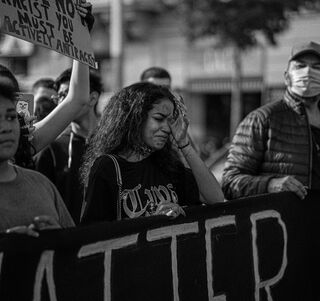Trauma
Historical and Collective Trauma Among LGBTQ+ People
How hate, violence, and oppression negatively affect LGBTQ+ communities.
Posted November 23, 2022 Reviewed by Gary Drevitch
Key points
- After major tragedies, historically marginalized groups may experience historical or collective trauma.
- LGBTQ+ people may exhibit trauma symptoms (e.g., intense fear and difficulty concentrating) after learning about anti-LGBTQ+ hate violence.
- Microaggressions and other forms of discrimination may be triggers to cumulative historical or collective traumas.
It was just a week ago that I was called a “faggot” by a random man on the streets of New York City. It had been a long while since I’d heard that word directed at me. It was a term I heard regularly as a teenager — at school, in community spaces, in the media, and even occasionally at home. Sometimes the word was used to berate or insult me for my feminine mannerisms. Sometimes it was used casually to tell me I was being weird. Even when the word wasn’t directed at me — usually by teenagers who integrated it into their everyday vernacular — it still managed to make me feel dehumanized and inferior. So, when I heard that word, just minutes after having some drinks at an LGBTQ+ bar, it was not a new experience. It was one of hundreds, maybe thousands, of times I had heard the word in my four-and-a-half decades of existence.
My friend who witnessed the incident checked in on me the next day to see how I was feeling. As a true ally to LGBTQ+ people, she gave me the space I needed to process my feelings. We shared how we both were angry and shocked that it had even happened, while acknowledging how we remained silently in sync — in fear of escalating the situation and simply wanting to survive. I mentioned that the main reason I didn't fight back was that I feared that the man could have had a weapon and that I didn’t want to become a hate-crime statistic. We also recognized that we did not want to give the perpetrator any more power or space by talking about it further, especially since the event occurred just a couple of hours after I was honored by a local organization at their annual gala. What was truly a magical night could not (and should not) have been ruined by one person’s homophobic biases or insecurities.
After I told my husband about the incident later, I decided to not discuss it any further. I hoped for the whole experience to become a faded memory. My attempts seemed to be successful for a few days. However, on Sunday morning I woke up and learned about the shooting in Colorado Springs. An armed man opened fire at Club Q (an LGBTQ+ nightclub) killing five people and injuring 17 others.
All of a sudden, it felt like that Sunday morning six years ago, when I woke up and learned about the murders of 49 people at Pulse, an LGBTQ+ nightclub in Orlando. Like 2016, I felt a punch in my stomach and a chill down my spine as I read details about the shooting. I felt a visceral tension in my heart as I imagined that it could have been me. We had just been at a gay bar. I had just been verbally assaulted with a homophobic slur. And despite receiving a prestigious award to recognize my scholarship and activism, I was reminded that this random man on the street viewed me as nothing more than a faggot.

Historical and Collective Traumas
Historical trauma is the notion that people of certain identity groups may develop similar reactions to violence or oppression directed toward their collective communities throughout history. For example, when Black people feel anguish, sadness, and rightful anger thinking about slavery and systemic racism, or when Indigenous people feel similar feelings when reflecting on colonialism and genocide, they are connecting to generations of pain and suffering of their families, communities, and ancestors. For LGBTQ+ people, historical trauma may involve connecting to the violent anti-LGBTQ+ oppression that people have encountered throughout history, from the queer or trans people who were harassed and brutalized by police to those who were jailed and sentenced to death for sodomy. Historical trauma could involve remembering people like Islan Nettles, Mark Carson, Jorge Stephen Lopez Mercado, Sakia Gunn, Muhlaysia Booker, Matthew Shepard, and thousands of others who were victims of heinous hate crimes. Historical trauma could also involve remembering the hundreds of thousands of LGBTQ+ people who died during the early HIV/AIDS epidemic, due to the government’s lack of response. Historical trauma could be felt annually on the Transgender Day of Remembrance when communities gather to remember the thousands of trans people who had been killed by violence.
Relatedly, collective trauma is the notion that a group of people may develop negative psychological symptoms after a member of that community suffers from an act of violence. Even if they did not directly encounter the act or know the victim or survivor personally, many trauma symptoms emerge (such as difficulty concentrating or functioning, loss of interest in life activities, or feeling unsafe or insecure in their everyday lives). Collective trauma can affect general populations (e.g., the lack of safety that most Americans felt after 9/11, the Boston Marathon bombing, and other acts of terrorism). Yet collective trauma can also affect specific communities (e.g., the fear that many Asian Americans have felt since the increase of anti-Asian hate violence during the COVID-19 pandemic). For LGBTQ+ people, collective trauma could be felt in reaction to the mass shootings in Orlando and Colorado Springs, but also in every single act of violence that targets LGBTQ+ people. They often connect to a sadness that they could have been targeted, as well as a fear that they could be next.
Collective trauma may manifest differently for LGBTQ+ people of different identity groups. First, because trans people (and Black trans women specifically) are so commonly and disproportionately targeted by violence, the collective trauma experienced by trans people (and especially Black trans people) may be much more palpable than for cisgender queer people (especially cisgender queer white people). In fact, the more commonalities that people have with victims of violence may also affect how the trauma is experienced. For instance, because most of the victims of the Pulse massacre in Orlando were Latinx, many LGBTQ+ Latinx folks described unique feelings of despair, based on the ways historical trauma has affected their intersectional identities and experiences.
Further, it is important to acknowledge how everyday incidents may serve as triggers to larger traumas. Research has supported that microaggressions may serve as triggers to cumulative historical traumas experienced throughout life. So, in similar ways that certain noises may trigger survivors of war to relive their traumas, microaggressions and other singular acts of discrimination may have similar effects. For instance, after being called a homophobic slur on the street, I was not just reacting to that one incident; I was reacting to the accumulation of every single time I’d ever heard that word. I was also reacting to every time any incident of systemic or interpersonal heterosexism made me feel shame, defeated, or less human.
Coping With Historical and Collective Trauma
If a person is experiencing symptoms of collective trauma, it is important to normalize those experiences. While traditional definitions of trauma assert that trauma can only be experienced by people who encounter it first-hand or by people who are close to the survivors, research has found that historical and collective traumas are normal and expected reactions by people not involved directly, too. Normalizing these experiences and talking about people’s reactions can be beneficial, particularly in connecting to emotions and working through fears, anger, and anxieties. On the contrary, attempting to repress or ignore these feelings may result in a number of negative behaviors, ranging from unhealthy coping mechanisms (e.g., alcohol or substance abuse, self-harm) or acting out behaviors (e.g., displacing anger onto others, toxic disruptions in relationships, etc.).

Regarding historical trauma, one of the difficult parts of coping is that the sources of the traumas are ongoing. When people may begin to heal from singular events, another traumatic event may arise. For instance, when mourning the murder of a Black man to state-sanctioned police violence, another may occur, resulting in re-emerging feelings that were never fully healed. Similarly, just when people are healing from Orlando Pulse, a tragedy that occurred over 6 years ago, the Club Q shooting in Colorado Spring emerges. So, unless hate violence stops in society, the cycles of historical trauma will continue for LGBTQ+ people and other marginalized groups.
Traumatology specialists often assert that in order to truly heal from a trauma, the survivor has to remove themself from the source. As an example, a survivor of intimate partner violence cannot heal until leaving the abusive relationship, or a survivor of ongoing sexual violence cannot heal until the abuser is no longer present in their lives. However, if people continue to encounter trauma due to systemic oppression (e.g., racism, sexism, heterosexism, cissexism, etc.) and hate violence based on that oppression, they can never fully heal if the violence and trauma persist.
So, if you have a loved one or a patient who is experiencing historical or collective trauma, please do your best to validate them and help them feel seen or heard. Don’t gaslight them or tell them they are overacting. Their reactions are normal, expected, and valid. And every single person will have a unique way that they will cope with or heal from those historical or collective traumas.
Finally, it is crucial to acknowledge that LGBTQ+ people (and other historically and contemporarily marginalized groups) continue to demonstrate their resilience and experience joy, despite the traumas they encounter in the world. They have learned to be vigilant, to use their voices when they feel able, and to be strategic when they do not. And when they are brave enough and able to work together (along with allies and upstanders), they can even be heroes who prevent further violence or harm inflicted on our communities.




